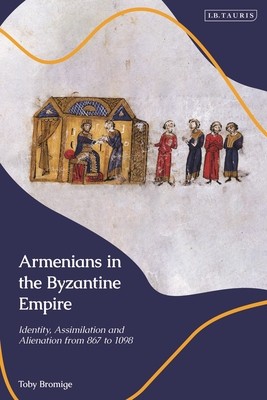
- We will send in 10–14 business days.
- Author: Toby Bromige
- Publisher: I. B. Tauris & Company
- ISBN-10: 0755642422
- ISBN-13: 9780755642427
- Format: 15.6 x 23.4 x 1.3 cm, kieti viršeliai
- Language: English
- SAVE -10% with code: EXTRA
Reviews
Description
The role of Armenian peoples in the Byzantine Empire has long been identified; they served as soldiers, generals, priests, with some later descendants even rising to the throne. This book investigates the relationship between the Armenians and Byzantines more closely, arguing that up until the eleventh century migrants of Armenian background were able to fully assimilate into the Empire, recognized fully as Romaioi (Byzantine Romans).
Using the extant sources and material culture the book explores in a chronological approach migration, ethnic stereotypes, and cultural assimilation to bring to life the experiences of Medieval Armenians as they settled into their new home. A close study of the role of religion in the forming of identity reveals that initial differences in belief between the Byzantines and Armenians was not a major stumbling block. From the turn of the eleventh century however, migrating groups of Armenians resisted the process of assimilation, holding onto their ancestral and religious identity, viewing the Byzantines with suspicion. This book charts for the first time this downturn in relations, which would go on to have dire consequences in the late eleventh century when Byzantium faced its most severe crisis since the seventh-century, the arrival of the Turkic peoples in Anatolia.EXTRA 10 % discount with code: EXTRA
The promotion ends in 22d.01:59:44
The discount code is valid when purchasing from 10 €. Discounts do not stack.
- Author: Toby Bromige
- Publisher: I. B. Tauris & Company
- ISBN-10: 0755642422
- ISBN-13: 9780755642427
- Format: 15.6 x 23.4 x 1.3 cm, kieti viršeliai
- Language: English English
The role of Armenian peoples in the Byzantine Empire has long been identified; they served as soldiers, generals, priests, with some later descendants even rising to the throne. This book investigates the relationship between the Armenians and Byzantines more closely, arguing that up until the eleventh century migrants of Armenian background were able to fully assimilate into the Empire, recognized fully as Romaioi (Byzantine Romans).
Using the extant sources and material culture the book explores in a chronological approach migration, ethnic stereotypes, and cultural assimilation to bring to life the experiences of Medieval Armenians as they settled into their new home. A close study of the role of religion in the forming of identity reveals that initial differences in belief between the Byzantines and Armenians was not a major stumbling block. From the turn of the eleventh century however, migrating groups of Armenians resisted the process of assimilation, holding onto their ancestral and religious identity, viewing the Byzantines with suspicion. This book charts for the first time this downturn in relations, which would go on to have dire consequences in the late eleventh century when Byzantium faced its most severe crisis since the seventh-century, the arrival of the Turkic peoples in Anatolia.

Reviews